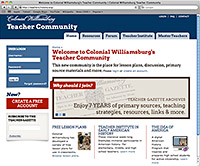Page content
Acrimony in Bruton Parish Church
Teacher Community

Find more lesson plans, resources, discussion, and more at our new Teacher Community website.
Membership is free. Join today!
Introduction
In 1773 very little of a revolutionary nature was occurring in Williamsburg, but the city was not without its controversies and excitement. One of the more interesting events was Bruton Parish's search for a new rector.
The church had filled its vacant minister's position numerous times before with little difficulty. But this time the search involved a clash of personalities and religious doctrines. The status of holding the most coveted and powerful rectory in the colony intensified the controversy. This role-play activity will demonstrate to students the importance of religion in the eighteenth century and the involvement of citizens in the selection of the rector of Bruton Parish Church.
Time Required
Three 45-50 minute class periods
Materials
- Graphic Organizer: The Candidates
- Graphic Organizer: The Role of the Vestry
Objectives
As a result of this lesson, the student will be able to:
- explain and give examples of the meaning of the words acrimony and dilemma
- use critical thinking skills to draw conclusions about 18th-century people
- engage in a role-play activity in order to explore feelings, attitudes, values and problem solving strategies
Setting the Stage
Brainstorm with students the meaning of the word acrimony. Ask if they have ever been involved in an argument in which individuals were angry and quick tempered. Next ask them to define the word dilemma. Ask them if they have ever had to make a difficult decision in which it seemed impossible to arrive at satisfactory solution. Inform the students that in eighteenth-century Williamsburg, the parishioners of Bruton Parish Church were involved in a dilemma in which tempers reached the boiling point.
The dilemma was this: should the parish be led by the Rev. Mr. Samuel Henley, a moralist who held passionate views on religious toleration but who some parishoners felt had unorthodox theological views; or by the Rev. Mr. John Bracken, a newcomer, who was known to strictly adhere to the teachings of the established church? This controversy can best be described as a conflict between traditional religious beliefs and the new beliefs of the Enlightenment.
Strategy
Divide class into six collaborative groups. Give each student a copy of the graphic organizer "The Role of the Vestry." Appoint a team leader and recorder for each group. When each group has completed this graphic organizer, ask each team leader to report back to the class. Before continuing, be sure that students understand that the Church of England was the state church of Virginia. There was no separation of church and state at this time.
Next give each student a copy of "The Candidates". Inform them that in a few minutes they will select the vestry for Bruton Parish Church for the year 1773. Ask them to read over silently "The Candidates". You may wish to discuss difficult vocabulary and the issue of bias with students. Then, in their own words, have students write an opinion of each candidate, why they came to that opinion and how they plan to vote when the vestry is asked to appoint a new rector. When they are finished with this activity, allow time for each student to share his or her thoughts.
Next have the class select twelve of its number to represent the vestry of Bruton Parish Church. Before continuing, ensure that all students understand the role of the vestry and its importance in eighteenth-century life (see notes on the vestry in "The Role of the Vestry.") Ask two members of the class who were not selected as vestrymen to represent the Rev. Mr. Henley and the Rev. Mr. Bracken. Inform these two "gentlemen" that they will deliver to the vestry a short speech explaining why they should be selected to be the new rector.
After the Reverends Mr. Henley and Bracken have delivered their speeches, have the vestry debate the following: "Should the parish be led by the Rev. Mr. Samuel Henley, a moralist who held passionate views on religious toleration but who some parishoners felt had unorthodox theological views; or by the Rev. Mr. John Bracken, a newcomer, who was known to strictly adhere to the teachings of the established church?" It is not necessary for them to come to a consensus.
Conduct the vestry vote. Following eighteenth-century voting procedures, the vote should be oral. When voting, each member of the vestry will give a reason for his vote. Ask members of the class who were not members of the vestry to comment on the decision made for them. Do they agree or disagree with this decision and why?
In conclusion, share with the students the following article that was printed in the Virginia Gazette:
June 12, 1773
The Vestry proceeded to the Choice of a Minister for Bruton Parish, in the Room of Mr. Johnson, deceased, when Mr. John Bracken was chosen, and accordingly sent for and came, when he agreed to perform all the Services of the Church, in the same Manner as before by his Predecessor; and in Case the Parishioners should choose to have a Lecturer for every Sunday Afternoon, that he would not refuse his Pulpit; all which he promised faithfully, and likewise to officiate to the End of the Year for the Benefit of Mrs. Johnson.
---Matthew Moody, Junior, C.V.
Virginia Gazette, December 16, 1773
Alternate Plan
Have students write a script based on this debate and present it as a reader's theater. If time permits, students could create puppets and present this as a puppet show.
Assessment
Have the students write an article for the Virginia Gazette describing the dilemma and how this dilemma was solved.
